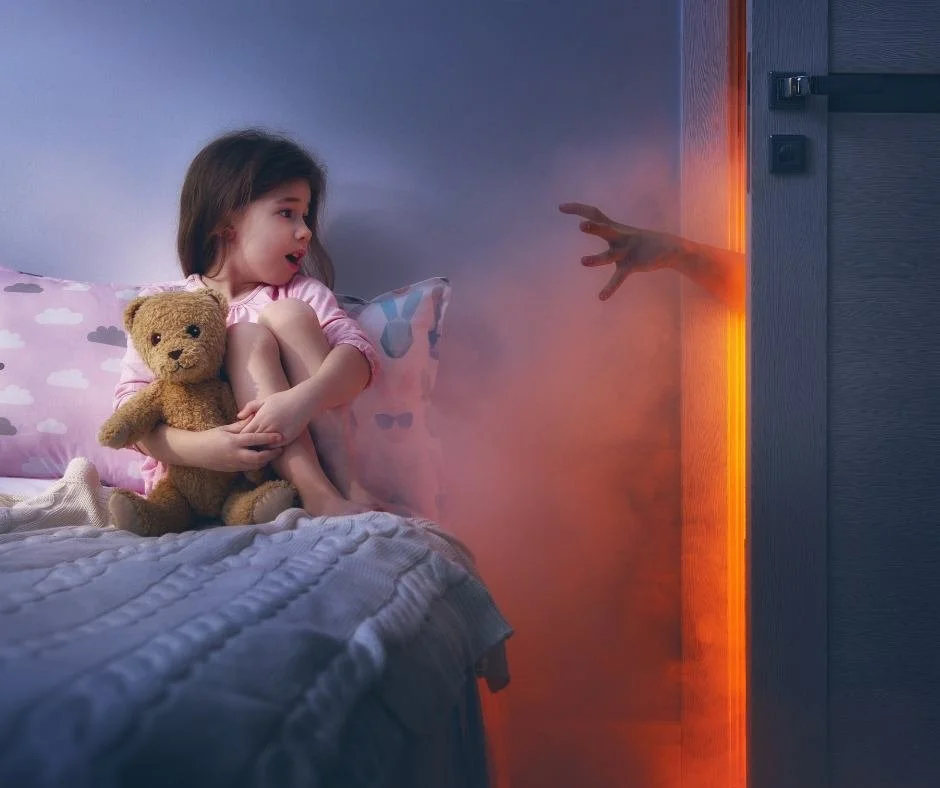Navigating Nighttime Anxiety in Children
As a parent, witnessing your child struggle with anxiety can be heart-wrenching. Nighttime anxiety, in particular, poses its own set of challenges, affecting not only your child's sleep but also their overall well-being. Understanding and navigating nighttime anxiety in children requires patience, empathy, and a proactive approach.
In this blog, we will explore the causes of nighttime anxiety, signs to look out for, and practical strategies to help your child overcome these challenges.
Understanding Nighttime Anxiety in Children
Nighttime anxiety in children can manifest in various ways, from trouble falling asleep to frequent waking during the night. It is essential to recognize that anxiety is a normal part of childhood development, but when it interferes with sleep, it becomes a concern. Common triggers for nighttime anxiety include:
Separation Anxiety: Younger children, in particular, may experience separation anxiety when left alone in their rooms. Fear of being away from their parents can lead to nighttime distress.
Fear of the Dark: The fear of darkness, commonly known as nyctophobia, is a prevalent cause of nighttime anxiety. Children may feel scared when the lights go out, imagining monsters or other frightening creatures.
Nightmares and Night Terrors: Vivid and frightening dreams can contribute to anxiety. Nightmares are more common in older children, while night terrors, which involve intense fear and screaming, are prevalent in younger children.
Traumatic Experiences: Past traumatic experiences, even if seemingly unrelated to bedtime, can resurface during quiet moments, triggering anxiety and nightmares.
School-related Stress: Academic pressure, concerns about performance, or social challenges at school can contribute to nighttime anxiety. Children may ruminate on these issues as they try to sleep.
Parental Stress: Children are highly attuned to their parents' emotions. If there's tension or stress within the household, children may internalize these feelings and experience anxiety at night.
Family Changes: Major changes within the family, such as divorce, the arrival of a new sibling, or a move to a new home, can be unsettling for children and trigger anxiety at bedtime.
Fear of the Unknown: Children may experience anxiety about future events or the unknown, such as starting a new school year or facing unfamiliar situations.
Peer Relationships: Struggles with friendships or social dynamics can weigh heavily on a child's mind, causing anxiety that may surface at bedtime.
Unresolved Daytime Worries: Children may carry unresolved worries or stress from the day into bedtime, making it difficult for them to relax and fall asleep.
Lack of Emotional Regulation Skills: Children who have difficulty managing their emotions may find it challenging to cope with anxiety at bedtime, leading to disrupted sleep.
Stress and Overstimulation: Like adults, children can become stressed or overstimulated, especially if they have had a busy day. This can make it challenging for them to unwind and relax at bedtime.
Lack of Consistent Routine: Inconsistencies in bedtime routines, such as irregular sleep schedules or unpredictable bedtime rituals, can contribute to anxiety as children crave stability and predictability.
Signs of Nighttime Anxiety in Children
Identifying nighttime anxiety in children requires careful observation. Look out for the following signs:
Resistance to Bedtime: If your child consistently resists going to bed or expresses fear about sleeping alone, it may be a sign of nighttime anxiety.
Frequent Waking: Children with nighttime anxiety may wake up multiple times during the night. They might seek reassurance from parents or have difficulty going back to sleep independently.
Physical Symptoms: Anxiety can manifest physically, leading to complaints of headaches, stomachaches, or other discomforts that seem to intensify at bedtime.
Changes in Behavior: Watch for changes in behavior, such as increased clinginess, irritability, or a sudden reluctance to participate in activities they once enjoyed.
Strategies to Navigate Nighttime Anxiety in Children
Establish a Consistent Bedtime Routine: Creating a predictable and calming bedtime routine can provide a sense of security for anxious children. Include activities that promote relaxation, such as reading a book, taking a warm bath, or practicing deep-breathing exercises.
Address Fears and Concerns: Encourage open communication about your child's fears and concerns. Listen actively, validate their feelings, and discuss ways to alleviate their worries. For example, a nightlight or a favorite stuffed animal can provide comfort.
Create a Comfortable Sleep Environment: Ensure that your child's bedroom is conducive to sleep. This includes a comfortable mattress, appropriate room temperature, and minimal noise. Consider using blackout curtains to address the fear of the dark.
Limit Screen Time Before Bed: Exposure to screens before bedtime can contribute to anxiety and disrupt sleep patterns. Establish a screen-free time at least an hour before bedtime to allow your child's mind to wind down.
Teach Relaxation Techniques: Introduce relaxation techniques such as deep breathing or guided imagery to help your child manage anxiety. Practice these techniques together during the daytime so that they become familiar and comforting at bedtime.
Provide Reassurance, but Encourage Independence: While it's important to reassure your child, encourage gradual independence. Let them know you are nearby if they need you, but empower them to face and overcome their fears on their own.
Seek Professional Help if Needed: If nighttime anxiety persists and significantly impacts your child's well-being, consider seeking the guidance of a Play Therapist. They can help identify underlying issues and provide appropriate interventions.
Navigating nighttime anxiety in children requires a holistic and empathetic approach. By understanding the triggers, recognizing signs, and implementing practical strategies, parents can create a supportive environment for their children to overcome nighttime anxiety. Remember, each child is unique, and finding the right combination of strategies may take time. Patience, consistent effort, and a nurturing atmosphere will contribute to your child's ability to conquer nighttime anxiety and enjoy restful sleep.
Janine Kelly, MSW, LCSW, RPT™, CBT-C, ADHD-CCSP, ASDCS, CCATP-CA, CATP is a Neurodiversity Affirming Psychotherapist in Middlesex, NJ. She specializes in supporting neurodivergent children and prenatal/postpartum parents with ADHD, Autism, Anxiety, and Trauma.
*This blog is not a substitute for therapy. To request an appointment, please click below:



